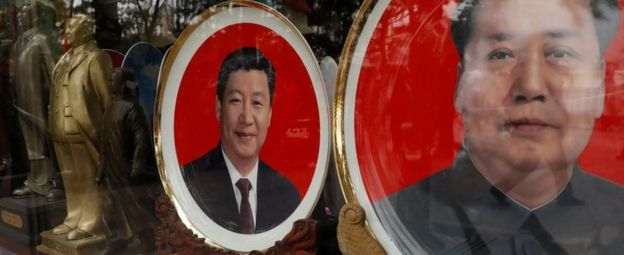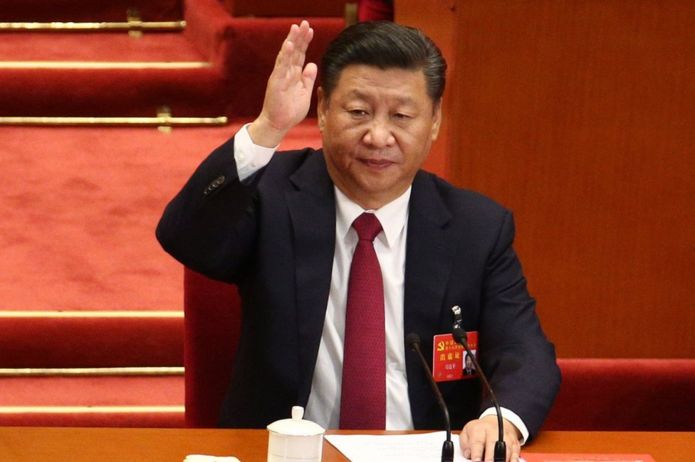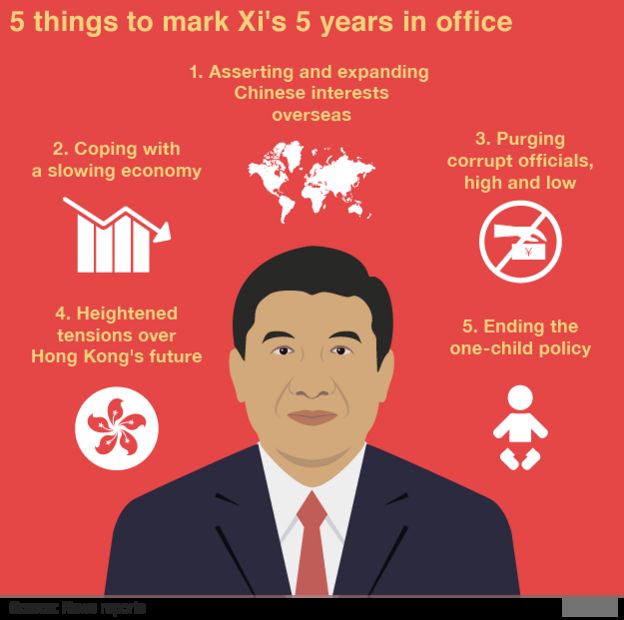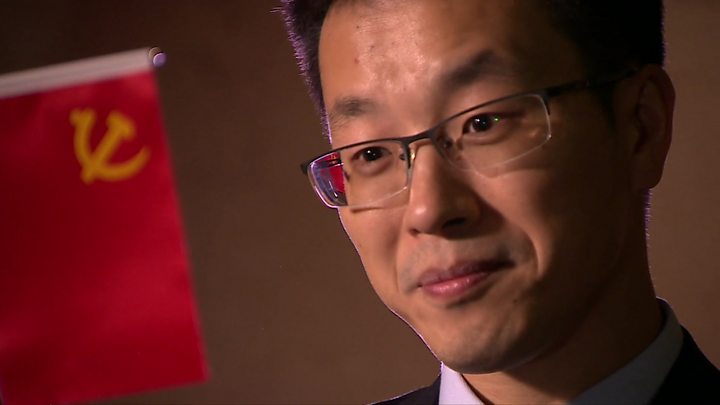Politics, Cults and Personalities

The trend towards personality cults in politics seems irresistible these days with the news that this catchy new political slogan which has been incorporated into the constitution of the Chinese Communist Party:
"Xi Jinping Thought on Socialism with Chinese Characteristics for the New Era"
Donald Trump is effectively 'worshipped' by the most fanatical elements of his supporter base and Trump has previously explained, in admiring tones, that he would not lose their support if he pulled out a gun and shot some innocent person in the street.
Closer to home Jeremy Corbyn 'walks on water' as far as the Corbynistats are concerned and unveiled a mural of himself recently, in his local constituency of Islington, without a trace of irony or concern.
Just imagine the hoots of derision if Ed Miliband, Gordon Brown or Tony Blair had done something similar.
http://www.bbc.co.uk/news/world
Xi Jinping 'most powerful Chinese leader since Mao Zedong'
BBC - China

Image copyright EPA Image caption - Mr Xi took part in the vote on Tuesday
China's ruling Communist Party has voted to enshrine Xi Jinping's name and ideology in its constitution, elevating him to the level of founder Mao Zedong.
The unanimous vote to incorporate "Xi Jinping Thought" happened at the end of the Communist Party congress, China's most important political meeting.
Mr Xi has steadily increased his grip on power since becoming leader in 2012.
This move means that any challenge to Mr Xi will now be seen as a threat to Communist Party rule.
More than 2,000 delegates gathered in Beijing's Great Hall of the People for the final approval process to enshrine "Xi Jinping Thought on Socialism with Chinese Characteristics for the New Era" into the Communist Party constitution of China.
At the end of the process, delegates were asked if they had any objections, to which they responded with loud cries of "none", reported journalists at the scene.
China's ruling Communist Party has voted to enshrine Xi Jinping's name and ideology in its constitution, elevating him to the level of founder Mao Zedong.
The unanimous vote to incorporate "Xi Jinping Thought" happened at the end of the Communist Party congress, China's most important political meeting.
Mr Xi has steadily increased his grip on power since becoming leader in 2012.
This move means that any challenge to Mr Xi will now be seen as a threat to Communist Party rule.
More than 2,000 delegates gathered in Beijing's Great Hall of the People for the final approval process to enshrine "Xi Jinping Thought on Socialism with Chinese Characteristics for the New Era" into the Communist Party constitution of China.
At the end of the process, delegates were asked if they had any objections, to which they responded with loud cries of "none", reported journalists at the scene.
Xi Jinping: Please raise your hands if you disagree (to work report). The shouts of “meiyou!” ring out. “None.” A new era begins.
End of Twitter post by @nvanderklippe
Previous Chinese Communist Party leaders have had their ideologies incorporated into the party's constitution or thinking, but none, besides founder Mao Zedong, have had their philosophy described as "thought", which is at the top of the ideological hierarchy.
Only Mao and Deng Xiaoping have had their names attached to their ideologies - and Deng's name was only added to the constitution after his death.
Why is this important?
By Carrie Gracie, BBC China editor, Beijing

Image copyright - REUTERS Image caption - The change to the constitution puts Xi Jinping (left) on par with party founder Mao Zedong (right)
China's new slogan hardly trips off the tongue.
But schoolchildren, college students and staff at state factories will now have to join 90 million Communist Party members in studying "Xi Jinping Thought" on the new era of socialism with Chinese characteristics.
The expression "new era" is the party's way of saying this is the third chapter of modern China.
If the first was Chairman Mao uniting a country devastated by civil war, and the second was getting rich under Deng Xiaoping, this new era is about even more unity and wealth at the same time as making China disciplined at home and strong abroad.
Enshrining all of this under Xi Jinping's name in the party constitution means rivals cannot now challenge China's strongman without threatening Communist Party rule.
China's new slogan hardly trips off the tongue.
But schoolchildren, college students and staff at state factories will now have to join 90 million Communist Party members in studying "Xi Jinping Thought" on the new era of socialism with Chinese characteristics.
The expression "new era" is the party's way of saying this is the third chapter of modern China.
If the first was Chairman Mao uniting a country devastated by civil war, and the second was getting rich under Deng Xiaoping, this new era is about even more unity and wealth at the same time as making China disciplined at home and strong abroad.
Enshrining all of this under Xi Jinping's name in the party constitution means rivals cannot now challenge China's strongman without threatening Communist Party rule.
What is 'Xi Jinping Thought'?
At first glance, "Xi Jinping Thought" may seem like vague rhetoric, but it describes the communist ideals Mr Xi has continuously espoused throughout his rule.

Its 14 main principles emphasise the Communist Party's role in governing every aspect of the country, and also include:
- A call for "complete and deep reform" and "new developing ideas"
- A promise of "harmonious living between man and nature" - this is a call for improved environmental conservation, and could refer to the stated aim to have the bulk of China's energy needs supplied by renewables
- An emphasis on "absolute authority of the party over the people's army" - which comes amid what analysts call the largest turnover of senior military officials in modern Chinese history
- An emphasis on the importance of "'one country two systems" and reunification with the motherland - a clear reference to Hong Kong and Taiwan
More than 2,000 delegates have spent the week-long congress confirming picks for provincial party chiefs, governors and heads of some state-owned enterprises.
On Tuesday, they finalised the make-up of top bodies such as the Central Committee and the Central Commission for Discipline Inspection.

Media caption - How a student counsellor sees the Communist Party Congress
What happens next?
On Wednesday, the new Central Committee will decide who gets to be in the higher-level Politburo.
Though delegates get some say, in reality the elections are guided by the party's top leadership where at each stage voters pick from pre-selected candidates.
Also on Wednesday, the party will reveal the new members of its pinnacle body, the Politburo Standing Committee. Mr Xi is widely expected to remain as party leader, while prominent Xi ally and anti-corruption chief Wang Qishan has stepped down and will not be in the next formation of the committee.
Those in the Standing Committee will be especially scrutinised. Analysts say its make-up may give signs of how long Mr Xi plans to stay on at the top of the party - he is expected to remain at the helm until at least 2022 - or any possible successors.
On Wednesday, the new Central Committee will decide who gets to be in the higher-level Politburo.
Though delegates get some say, in reality the elections are guided by the party's top leadership where at each stage voters pick from pre-selected candidates.
Also on Wednesday, the party will reveal the new members of its pinnacle body, the Politburo Standing Committee. Mr Xi is widely expected to remain as party leader, while prominent Xi ally and anti-corruption chief Wang Qishan has stepped down and will not be in the next formation of the committee.
Those in the Standing Committee will be especially scrutinised. Analysts say its make-up may give signs of how long Mr Xi plans to stay on at the top of the party - he is expected to remain at the helm until at least 2022 - or any possible successors.
- The rising stars of China's Communist Party
- Are women welcome in Chinese politics?
- The Chinese family in five charts
However, it has also seen growing authoritarianism, censorship and a crackdown on human rights.

